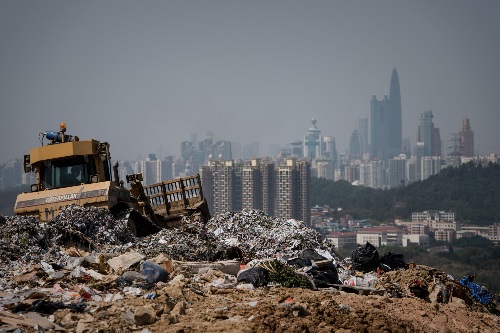Waste management is a significant environmental problem in Hong Kong, with the city generating a large amount of solid waste daily. In 2022, 6,800 metric tons of domestic waste ended up in landfills every day. This is equivalent to the weight of about 3,400 Asian male elephants.
The lack of a sufficient waste management system in Hong Kong has resulted in overflowing landfills and increasing methane emissions as a result. Methane is a powerful greenhouse gas that has 80 times the warming power of carbon dioxide over 20 years. Despite efforts to promote recycling and waste reduction, Hong Kong struggles with limited recycling infrastructure and low recycling rates, exacerbating the waste management challenge.
To tackle the growing waste crisis, Hong Kong introduced a Waste Tax Scheme, a municipal solid waste charging initiative. By requiring residents to dispose of garbage only in designated bags that they must purchase, the scheme incentivizes waste reduction and recycling. The waste tax scheme will charge residents 11 HK cents (US 1 cent) for each litre of garbage they throw away. Plastic bags for waste disposal come in different sizes and are priced accordingly. Failure to comply will result in a fine of HKD 1,500 (USD 190). While the scheme aims to reduce waste generation and encourage recycling, it has encountered several challenges that are raising concerns among residents.

Government-issued bags are made out of plastic
One of the challenges facing the Waste Tax Scheme is the use of plastic bags for waste disposal. While these government-issued bags are intended to facilitate waste collection and measurement, they inadvertently contribute to the city's plastic pollution problem. The irony of combating waste while adding to plastic pollution has sparked criticism and calls for more sustainable alternatives to be considered.
The potential for illegal bag production at a lower price
If and when the price of government-issued bags rises, there is the possibility of illegal production of cheaper plastic bags. This not only undermines the scheme's objectives but also poses a significant threat to environmental sustainability. The allure of cost-saving measures may lead to a surge in counterfeit plastic bags, further exacerbating Hong Kong's plastic pollution issue.
The Hong Kong income gap
Income inequality in Hong Kong poses a significant challenge to the Waste Tax Scheme's implementation. With a substantial disparity between the rich and the poor, the tax price fails to consider the range of income levels in the city. For individuals with low incomes struggling to make ends meet, the fines are extremely hefty. This disparity highlights the need for a more inclusive and equitable waste management strategy that addresses the financial circumstances of all residents.
Charging residents won’t lead to lasting behavior change
While the Waste Tax Scheme aims to reduce waste through financial penalties, the approach may not always yield the desired results. Asking individuals to pay based on their waste disposal amounts can lead to unintended consequences, such as stockpiling waste which can lead to household hygiene issues. The challenge lies in striking a balance between encouraging responsible waste management practices and avoiding potential harmful side effects.
There is an urgent need to address the potential unintended consequences that may occur as a result of the scheme. Exploring alternative materials for waste disposal, mitigating the risks of illegal production, implementing measures to support low-income households, and fostering behaviour change through targeted education and awareness campaigns are crucial steps towards overcoming the obstacles hindering the scheme's effectiveness.
The challenges facing Hong Kong's Waste Tax Scheme underscore the complexities of waste management and the importance of addressing these issues to achieve a cleaner city. By acknowledging the above challenges, and engaging in constructive dialogue with the general public and key decision-makers, Hong Kong can improve its waste management system.
Posted 09/04/2024

















